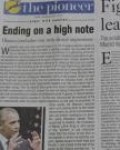The Pioneer rationalises, poor dear
The Pioneer edit was an awful embarrassment as it tried to explain away Obama's remark on religious tolerance.
DARIUS NAKHOONWALA reels in disbelief.

You don’t say!
Darius Nakhoonwala
The Pioneer edit on Obama’s visit has left me stunned for its sheer idiocy. I have never seen anything like it. Here’s the link if you want to see how stupid a paper can get when it ties itself to a political party. I don’t see why I should be the only one to feel so acutely embarrassed.
As might be expected of a BJP supporter, the paper the called the visit “a roaring success”. Immediately after that, it referred to Obama’s remark about religious harmony. I must quote the edit at length as it seeks to soften Obama’s parting shot. Pity that the editor forgot what one very senior BJP leader once said: “When they were asked to bend, they chose to crawl.”
It was not a “subtle disapproval of the freedom given to voices from fringe right-wing elements in the country in the name of ghar wapsi,” the edit said. “But that would be a misreading because the US President expressed exactly the same opinion that Prime Minister Modi and his senior Cabinet colleagues repeatedly have on the subject. When he (Obama) said that ‘India will succeed so long it is not splintered on religious lines”, he stated almost in exact words what responsible leaders from the incumbent regime have been using. ...he was not being India-specific on purpose, but commenting on a strain of intolerance, even if sparse, in vibrant democracies - and the need to counter it...In other words, Mr Obama's remarks were not a ‘parting shot’ to the Indian Government, as some commentators, who are forever looking to run down the ruling Bharatiya Janata Party, would like to believe.”
The edit goes on and on in this strain: “The futility of looking at President Obama's Siri Fort address as some kind of subtle displeasure of the Centre's response to sectarian remarks, should be evident from the bonhomie that he shared with Mr Modi - with both calling each other “friends” - and even hugging each other more than once (this is not usual with Mr Obama as he is said to be very reserved in his conduct in public).”
There was more. “Surely, this kind of proximity would not have been there had Mr Obama been upset with the Government's handling of the communal remarks that some elements supposedly (but not really) having the regime's support. Nor would the ground have been prepared for the many initiatives that have been agreed upon in defence collaboration.” Blah, blah, blah.
The rest of the edits on President Barack Obama’s second visit to India, which was preceded by visits by the Russian president (last November) and the Chinese president (last October), failed to perceive the real change, as opposed to the superficial ones or the newsy ones like Obama’s parting shot about the need to treat all religions equally.
The real change is that the relationship has now moved from a mere desire on the part of the heads of government to the government itself. Ministers and bureaucrats will now do as bidden rather than sabotage efforts at the highest level as has happened in the past.
The Indian Express wrote a quick general comment that left the reader none the wiser. The only sensible sentence was this: “Unlike the UPA government, which was hesitant to engage the US... Modi has now decided to work with Obama...Over the longer term, this could be the most consequential development in India’s relations with America.”
The Hindu wrote far too much (972 words). Possibly the only valid point in the edit was the demand that “the Indian public must be informed about exactly what assurances have been given to U.S. officials in return for their acceptance of the Indian liability law, and what the added costs would be.” Yes, agreed.
The Telegraph called the visit an “outstanding success” and gave the entire credit to Barack Obama. It then listed examples of his brilliance. Narendra Modi barely figured in the edit which mentioned him just thrice in passing.
The Times of India also had very little to say other than to note: “In the long run, Beijing will respect Indian interests more if it perceives New Delhi to be friendly with Washington. Modi nevertheless needs to take care not to rub the Chinese the wrong way while defending legitimate Indian interests.” Right. Got it.
The Hindustan Times wrote a suitably scholarly but waffly edit which can be ignored.
Such articles are only possible because of your support. Help the Hoot. The Hoot is an independent initiative of the Media Foundation and requires funds for independent media monitoring. Please support us. Every rupee helps.
Subscribe To The Newsletter






